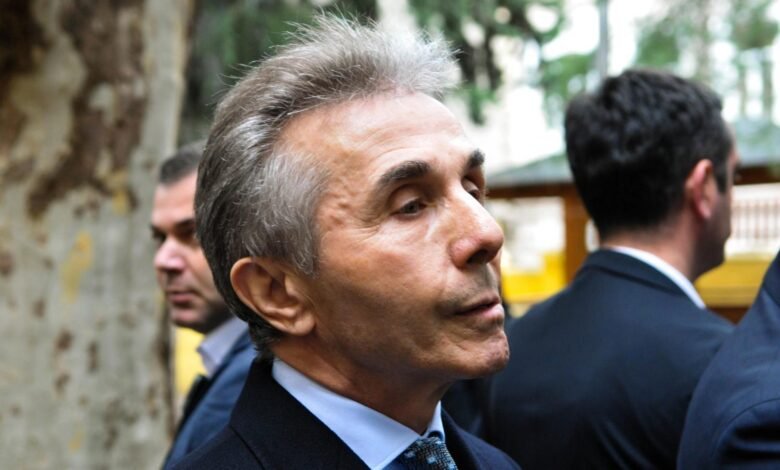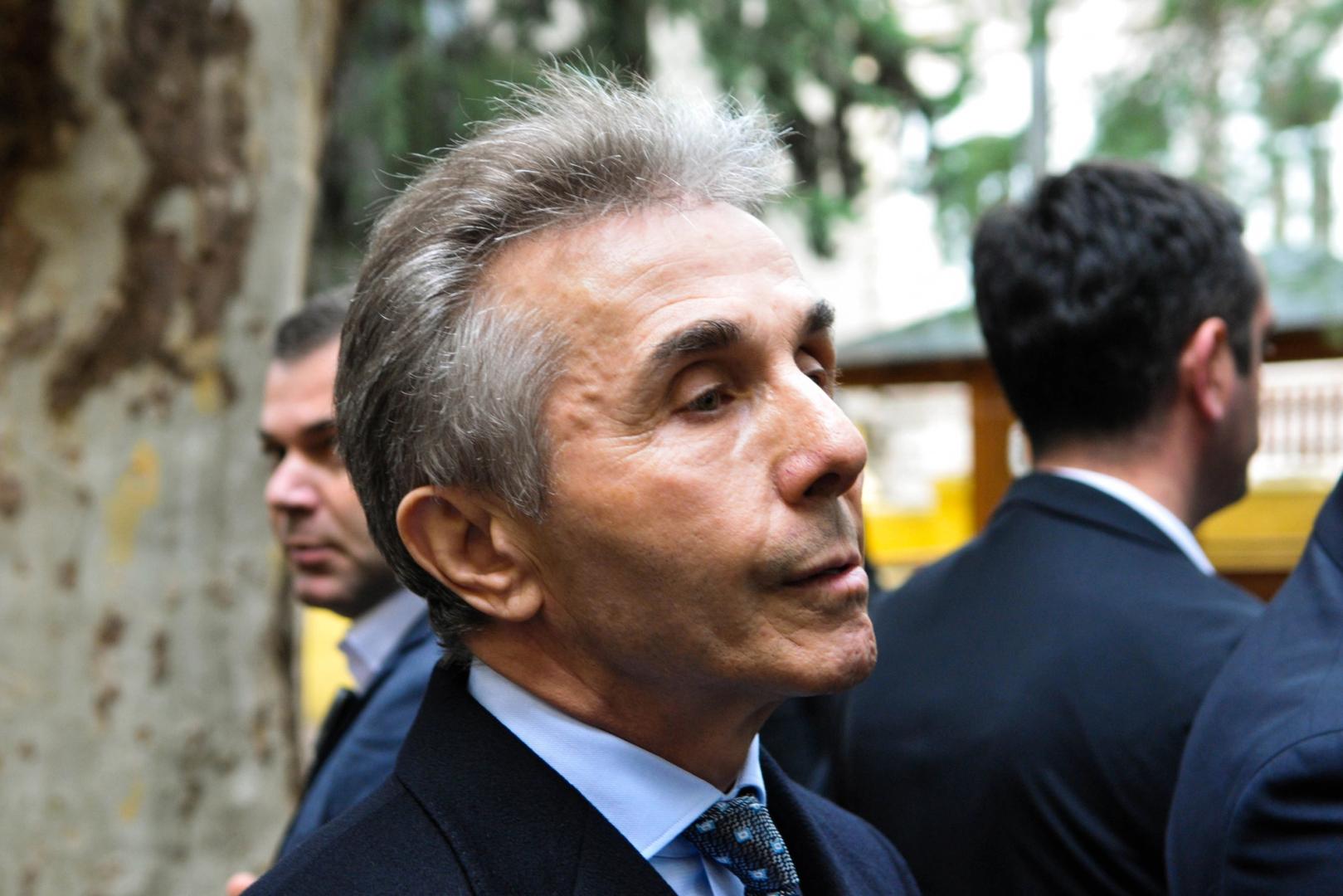Georgia’s ‘Shadow Ruler’ Is Trying to Claw Back a Bitcoin Fortune Worth $1B


This may rank among the biggest missed opportunities to generate wealth in the history of Bitcoin. And it left in its wake a trail of corruption, revenge and extortion.
The strange story began a decade ago in the foothills of the Caucasus mountains in the country of Georgia. The man who missed out on what could now be a $21 billion fortune is Georgia’s reclusive leader. He has since resorted to blunt force and the vast resources of a nation state to obtain what he failed to get when he declined a credible offer to mine Bitcoin in the early years of the cryptocurrency’s existence.
I first heard elements of this story this summer, from an acquaintance in Tbilisi, the Georgian capital. He is preternaturally connected and has a talent for recounting real-life novellas featuring improbable characters in various parts of the world.
I have learned over the years that his stories tend to be true more often than not, so when I heard this one, I wanted to know more, thinking I’d spend a week on it and maybe write something. Instead, I spent months burrowing deeper into a geopolitical crypto rabbithole that keeps furnishing stranger-than-fiction plot twists.
I wrote the first story for the New York Times earlier this month, detailing how the Georgian leader in question, Bidzina Ivanishvili, went after his former financial advisor with pliant courts, intelligence agents, an international abduction and a jailhouse beating in an ongoing and so far unsuccessful effort to gain control of the imprisoned advisor’s Bitcoin holdings.
What follows below is the previously untold story of the true extent of Ivanishvili’s Bitcoin miss and his attempts to claw back at least some of the cryptocurrency in ways that resemble a shakedown. It can be read independently of the New York Times story.
But first, let’s go back to a Georgia of a decade ago. The post-Soviet republic had been known outside of its borders largely for its spectacular food and an ancient winemaking tradition, of which it is endlessly proud. Then-President Mikheil Saakashvili who led Georgia for a decade until 2012 was charismatic, young and a little crazy, and he rid Georgia of entrenched corruption, opened it up to international investment and allied it with the West, drifting away from Moscow’s orbit. That record was marred by Saakashvili’s own eventual slide toward abuse of power.
Enter Ivanishvili, who succeeded Saakashvili and later had his predecessor locked up on politically-motivated charges. Ivanishvili held office only briefly, preferring instead to steer Georgia from outside of the political hierarchy. Much of the coverage of his ongoing shadow rule has focused on his efforts to put Georgia back under Russian influence and roll back core democratic freedoms.
What has remained hidden from public view, until he launched an extra-judicial campaign to punish his former financial advisor and claw back nearly $1 billion in what he sees as his “stolen” bitcoin, are his misadventures in the crypto world.
In 2014, a crypto mining startup called Bitfury set up a data center in Georgia. Co-founded by a Latvian-born computer scientist, Bitfury employed a senior Georgian executive who suggested that the company should take advantage of his country’s business-friendly laws and unusually low electricity rates, the single biggest operating cost in crypto mining.
Back then, Bitfury was facing a conundrum peculiar to crypto pioneers: it was bitcoin-rich but fiat-poor. The young company was mining so much bitcoin that it was already profitable on paper but it was reluctant to sell bitcoin to raise cash necessary for expanding the business. Its executives believed the price of bitcoin would keep rising and the cryptocurrency would mature into a global store of value. But it was a belief ahead of its time and many traditional investors were deeply skeptical of bitcoin’s potential and wary of betting on companies whose primary business model relied on accumulating an untested asset. So Bitfury had to get creative about fund-raising: among other tactics, the company began renting out mining capacity to select investors willing to take the long view. It was a digital version of leasing a small plot of farmland for a year, growing tomatoes on it, and keeping the harvest at the end of the lease.
Georgia is a small country — and Ivanishvili looms large over it. Bitfury representatives pitched to him an intriguing idea: buy $50 million worth of Bitfury’s mining computers’ processing time and keep the Bitcoin these computers generate. Three people familiar with the episode described it to me in some detail. According to one of them, the pitch took place in Ivanishvili’s residence on a hill overlooking Tbilisi, the Georgian capital. Visible from many points in the city stretching below, the house is a funky, sprawling jumble of glass and steel designed by a Japanese architect.
Although his estimated net worth has declined significantly compared to prior years, Ivanishvili is still a wealthy man. According to Forbes, he’s currently worth $2.7 billion. He made his money in Russia, beginning in the chaotic 1990s with imports of electronics and continuing with investments in banking, conventional mining and real estate. He sold most of his Russian assets before entering Georgian politics.
He used to go by Boris back in his Russian days, and though no evidence emerged to back it up, his detractors have mused that he’s a Manchurian candidate of sorts, cultivated by Russian intelligence to bring the rebellious Caucasus nation back under Moscow’s control. Ivanishvili has always denied this, and it is just as likely that his background and worldview simply align naturally with Russia. But it is not a worldview shared by most of his compatriots. Georgians generally support integration with the European Union and despise Vladimir Putin for having invaded Georgia in 2008 and hived off parts of its territory, which Russian troops continue to occupy.
Ivanishvili is known for his extravagant hobbies and tastes. He had his people uproot rare trees all over Georgia and re-plant them in a special park devoted to his fascination with giant trees, a project that likely cost him millions of dollars. “Since 2016, Georgians have been observing the surreal spectacle of some of the nation’s most impressive trees departing their longtime homes in forests and gardens and traveling by barge to a park on the Black Sea coast,” Eurasianet wrote in 2020.
If Ivanishvili’s rejected $50 million Bitcoin play sounds too big to be realistic, please consider that he reportedly dropped $96 million at Sotheby’s on a single Picasso painting, winning a bidding frenzy that started at $50 million. In 2006, it was the second-highest price ever paid at auction for a single painting. For years, a replica of the painting was said to hang on the wall of his James Bond-style Tbilisi mansion, the same place where Ivanishvili one day considered the merits of another expensive purchase: a trove of Bitcoin.
In 2015, when he was studying the Bitcoin proposal, his fiat fortune suddenly seemed to be at risk. A rogue banker at Credit Suisse, where some of his wealth had been parked, was submitting doctored investment reports and concealing losses, a long-running fraud that cost Ivanishvili nearly $1 billion. With help from the same advisor whom he later jailed in the Bitcoin dispute, Ivanishvili eventually succeeded in winning legal judgments against the bank. But he has had trouble collecting on the damages awards in part because he’s now under U.S. financial sanctions for undermining democracy. The wealth manager who committed the fraud served time in prison and killed himself in 2020.
So in 2015, when the full extent of the fraud was just starting to emerge, perhaps it wasn’t a good time for Ivanishvili to entertain the idea of literally sinking $50 million into a stack of computers submerged in a cooling liquid with a vague promise of producing digital tokens holding little discernible intrinsic value. One could also conjecture that having just been swindled by one money manager, Ivanishvili was suspicious of others offering to safeguard and multiply his money.
At the time, Bitcoin was still a niche and novel financial product with a median price of around $272 in 2015, compared to $115,000 today. It attracted true believers but also had many critics who remained skeptical of the long-term value potential of Bitcoin, given the currency’s volatility.
In Georgia back then, one of the biggest Bitcoin boosters was George Bachiashvili, the same financial advisor who would later fall out spectacularly with Ivanishvili. Just 30 years old at the time and armed with an MBA degree, he embraced the promise of the blockchain and grasped the often arcane concepts and use cases underpinning it, according to people who knew him at the time.
“Bitcoin is more of a medium of exchange, something that has a utility that can be applied. That’s why we don’t look at it as a commodity,” Bachiashvili, whose private-equity firm was an early investor in Bitfury, told CoinDesk in 2014. “We look at it as a medium of exchange and that it will be used for money and signing transactions and proof of ownership and property.”
Bachiashvili tried to get others as interested in the emerging crypto ecosystem as he was.
As part of that effort, he helped Bitfury pitch a Bitcoin investment to Ivanishvili himself. Ensconced in his glass house with replicas of fine art decorating the walls (the originals were kept in a vault in London), Ivanishvili quickly rejected the $50 million mining proposal, without delving into any of the technical details, according to the three people familiar with the situation. “I don’t remember that anyone discussed any details on this as (Ivanishvili) did not express any interest to invest and any discussions stopped after this,” one of the people said.
Timur Tskivadze, a lawyer for Ivanishvili, says he has no information about this episode and sees no need to comment on it because it has “nothing to do” with the subsequent legal dispute that eventually landed Bachiashvili in jail.
As a co-founder of two banks — one in Russia and one in Georgia — Ivanishvili was much more comfortable in the world of fiat currencies and traditional lending.
So when Bachiashvili and Bitfury failed to interest the Georgian leader in bitcoin, Bachiashvili approached Ivanishvili’s Georgian bank for a loan to help him make a personal investment in bitcoin mining — similar to the one Ivanishvili had rejected for himself. The Georgian leader agreed and authorized a high-interest credit. Using the loan and personal funds, Bachiashvili rented $6.3 million worth of mining capacity from Bitfury and generated 24,000 Bitcoin a year later.
He paid back the loan with $600,000 interest, and the matter appeared closed. However, nearly a decade later, Ivanishvili accused the former advisor of stealing the bitcoin from him. Ivanishvili’s argument: the loan entitled him to a share of the mined Bitcoin. In May, Bachiashvili, who had escaped from Georgia, was snatched in a parking lot of an Abu Dhabi hotel, blindfolded and sent by private jet back to Tbilisi to serve an 11-year prison sentence, on dubious charges of theft and money laundering. He was beaten in jail.
It is possible to imagine that the Georgian leader, in his quest to punish the former advisor and gain access to his crypto wallets, was driven at least in part by the enormity of his own Bitcoin miss. Through his lawyer, Ivanishvili denied ordering the kidnapping, the jailing or the beating of Bachiashvili.
Had Ivanishvili taken the $50 million deal back in 2015 — and assuming his mining contract had followed the same ratio of invested capital to mined Bitcoin as Bachiashvili’s $6.3 million rental — the Georgian leader could have become one of the biggest individual Bitcoin holders in the world, a “whale” controlling some 190,000 Bitcoin. At current prices, his hypothetical crypto wealth would have climbed above $21 billion, dwarfing his known existing fortune. The course of Georgia might have been different too, though it is hard to assess whether a much wealthier Ivanishvili would have just enjoyed life and embraced even more extravagant pursuits–or deployed his new crypto fortune to amp up his efforts to remake the country in negative ways.
Satoshi Nakomoto, whose real identity remains a mystery, created Bitcoin after the 2008 financial crisis, thinking a decentralized digital currency would provide a safer alternative to the badly shaken traditional banking system. To battle inflation and forestall monetary manipulation, Nakamoto limited the total supply of bitcoin to 21 million tokens, of which about 19.9 million has already been mined.
When Bitfury set up its mining operation in Georgia over a decade ago, the pace of new bitcoin generation was much faster than it is today reflecting the cryptocurrency’s deliberately staggered deflationary structure under which the size of the reward for validating blockchain transactions is cut in half roughly every four years.
For those brave or crazy enough to believe in Bitcoin in those early years, mining presented a straight path to wealth generation. Back then, purchasing Bitcoin on the secondary market wasn’t as easy as it is today because exchanges were rudimentary, unregulated, prone to hacks and suffering from liquidity problems.
Given Bitcoin’s current price, Ivanishvili appears interested in obtaining the cryptocurrency by any means necessary. The Georgian leader’s sudden interest in his former advisor’s Bitcoin stash coincides in time with the severe drop of his own estimated net worth.
Global billionaire trackers at Bloomberg and Forbes have drastically revised down Ivanishvili’s wealth estimates this year — by $2 to $3 billion — and Bloomberg even removed him from its marquee ledger of the world’s 500 richest people. There’s no single reason for this estimated decline, but U.S. financial sanctions and continuing Credit Suisse difficulties are likely to have played a role.
Before his former advisor Bachiashvili went on trial in Tbilisi, Ivanishvili’s lawyer sent a proposal to his counterpart on Bachiashvili’s defense team. It is a bizarre document that puts a legalistic veneer on an intimidation attempt.
Delivered casually via Whatsapp, the document said Ivanishvili was prepared to accept 60% of what he claimed was his stolen Bitcoin with the implicit understanding that criminal charges would be dropped should Bachiashvili accept the deal.
Ivanishvili added a threat: for each month of inaction by Bachiashvili the amount of his crypto debt to the Georgian leader would be increased by 5%. And by the time the court ruled against Bashiashvili — the Whatsapp document left little doubt that an acquittal was unlikely — “the accused will lose the chance to receive any discounts” and would be liable for the 100% of the Bitcoin and would go to jail on top of that. Bachiashvili still retains significant Bitcoin holdings, though it is unclear how much is left from the original mining investment.
Ivanishvili’s lawyer confirms he sent this proposal on his client’s behalf and calls it “widespread practice” in criminal cases. Bachiashvili deemed it extortion and refused. As threatened, he was promptly convicted.
Bachiashvili’s lawyer David Jandieri — one of Bachiashvili’s lawyers who handles international aspects of the case — soon became the target of a smear campaign on a pro-Ivanishvili TV channel that called him a Western spy and a wannabe politician. He was also hauled in for questioning and threatened with criminal prosecution in connection with his defense of Bachiashvili.
Concerned for his physical safety, Jandieri has since fled Georgia by a complicated multi-country route, in a hurried manner not unlike his client’s own escape from Tbilisi back in March. The runaway lawyer hit a nerve-wracking snag at Georgia’s land border with Armenia where security personnel informed him that his passport was no longer valid. They took photos of him and called someone. And then they let him through. Jandieri no longer has access to his client, which may have been the whole point.
The ripples from the Bitcoin blowup continue spreading in the strangest of ways. The head of the Georgian security service who personally flew to Abu Dhabi to escort Bachiasvili on his forced return home abruptly resigned after just five months on the job, with no clear explanation.
While in jail, Bachiashvili says he was threatened by the prison warden who encouraged him to turn over his Bitcoin to Ivanishvili. After Bachiashvili refused, he was brutally beaten by another inmate. Georgian authorities later claimed Bachiasvili organized his own beating to make himself look better in international courts.
And the prison warden? He suddenly quit his job and was later found dead of a single gunshot wound in his garage. Georgian authorities said he likely killed himself.
#Georgias #Shadow #Ruler #Claw #Bitcoin #Fortune #Worth
Philip Shishkin

